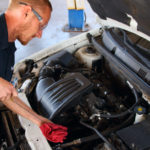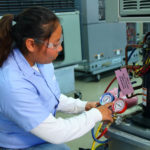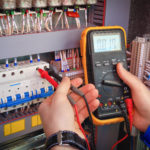What’s the Difference Between a Mechanic and a Technician: Job Duties
The difference between a mechanic and an automotive technician is big, each job has different job responsibilities.
Mechanics are more hands on while technicians diagnose issues using tools and technology
Automotive technician job duties include
- Reading diagnostic codes from vehicle computer systems.
- Creating repair plans for mechanics.
- Using technology to run diagnostics.
Mechanics have different duties, they specialize in mechanical systems like engines and brakes. Some of those duties include:
- Doing routine repair work.
- Doing car inspections at mileage intervals.
- Writing repair estimates and quotes.
- Explaining repairs to customers.
- Keeping records.
- Checking equipment and tools.
| Aspect | Technician | Mechanic |
|---|---|---|
| Main Focus | Diagnoses and repairs electronic, computer, and software systems in vehicles. | Focuses on mechanical parts such as engines, brakes, and transmissions. |
| Tools Used | Uses advanced diagnostic tools, computers, and specialized equipment. | Uses traditional hand tools for repairs and maintenance tasks. |
| Work Environment | Often works in dealerships or specialized shops. | Works in general repair shops or garages. |
| Job Duties | Reads diagnostic codes, plans repairs, and stays updated on new technologies. | Performs regular maintenance, conducts inspections, and explains repairs. |
| Skills Needed | Knowledge of modern vehicle technologies and electronic systems. | Expertise in hands-on mechanical work and basic vehicle maintenance. |
| Record Keeping | Maintains digital records of diagnostics and repairs. | Keeps detailed physical records of completed repairs and maintenance. |
| Communication | Communicates with mechanics to guide complex repairs. | Communicates directly with customers to explain needed repairs and services. |
Chances are, if you’ve ever had a repair done on your car or you’ve looked into car repair, you’ve heard both job titles “Automotive Mechanic” and “Automotive Technician.” You may even think these terms are interchangeable and represent the same thing. However, there are a few distinct differences between these two career paths, and they require different types and levels of training.
What is an Automotive Mechanic?
This might be the term that’s the oldest. It refers specifically to people who maintain and repair motors, machinery, and more. Mechanics are more hands-on, as the term itself implies, and are the people who work under and on your car to find out what’s making that noise. An automotive mechanic is primarily concerned with routine maintenance. They can also specialize in different areas of repair, but that’s not a requirement of the job. This can include brakes, tires, engines, and any other distinct area of a vehicle that you can identify.
The term automotive mechanic may bring to mind a specific image: a mechanic wearing coveralls, coated in grease and other stains, often with dirty hands and wrenches nearby. However, this is an outdated idea of what the career comprises. An automotive mechanic also has to be able to employ a variety of tactics to repair any concerns. They may not necessarily be involved in the diagnosis, but they know how to fix the problem in the best ways. This position involves serious critical thinking and problem-solving skills that are often ignored in favor of a more simple portrait of their abilities. Yes, mechanical implies more hands-on, but one often forgets about the attention to detail and care also required of the work.
What is an Automotive Technician?
As the job title implies, technology is involved in this career. Because modern vehicles have become so enmeshed with computers, a technician must have an understanding of that aspect of vehicle maintenance.
Often, technicians take on jobs that require a deeper focus and understanding of the area they’re repairing. Deep knowledge and attention to details are needed for technicians to fulfill their duties; typically technicians are specialists in the areas in which they work. That means a brake technician is a professional with an understanding of how brakes work and what exactly goes into repairing them. A technician needs to have the skills and knowledge to run diagnostics in their specialized area and employ technology to do so. While they may not participate in the repairs themselves, they are essential to diagnosing an issue and creating a plan to repair the problem. These people use computers and top-of-the-line equipment to determine why your car is making that noise, and they devise a plan to fix it.
Automotive Technicians Employ Technology
Cars are now significantly more complex than they once were. Computer systems are a large part of every new vehicle on the road, and a lot of diagnostics are run on a vehicle’s computer to get to the root of the problem. That means highly skilled technicians are needed to understand these complex computer systems in today’s vehicles. Even the simplest sounding jobs require this specialized knowledge to solve problems. Automotive technology is also advancing at an extreme rate, and that means technicians need more knowledge every day to perform their duties.
Technician vs. Mechanic: Job Duties
Each of these jobs requires different duties. For technicians, this can include:
- Defining various diagnostic codes from vehicle computer systems.
- Creating plans for repairs for mechanics.
- Employing technology to run diagnostics.
Mechanics typically have different job duties, and some of these can include:
- Completing routine repairs and maintenance.
- Fulfilling inspections at important mileage markers.
- Developing repair recommendations and quotes with accuracy.
- Describing repairs to vehicle owners.
- Maintaining accurate records.
- Completing checks for quality on equipment and tools.
Education
The education required for both of these jobs is very similar. However, there are some differences in the courses and training required to perform each job. A vocational program can teach the specific skills required for both mechanics and technicians. A person can also enroll in higher education, such as college, for automotive education.
After this, a person will want to complete an internship or apprenticeship to obtain important on-the-job training. This allows a person to employ the skills and knowledge they learned during their education in a hands-on way. Finally, certifications become important for those who want to practice in their field.
If you’re looking to start your career in the automotive repair industry, beginning your education today is a necessary first step. Arizona Automotive Institute offers excellence in vocational training to kick-start your career. Apply today to start your journey into a new and thriving career.
Information within this blog is for general information purposes only. AAI does not assume or guarantee certification/licensures, specific job/career positions, income earning potential or salary expectations based on the programs offered at AAI. Career and program information statements in this blog do not guarantee that programs or other information mentioned are offered at AAI.





